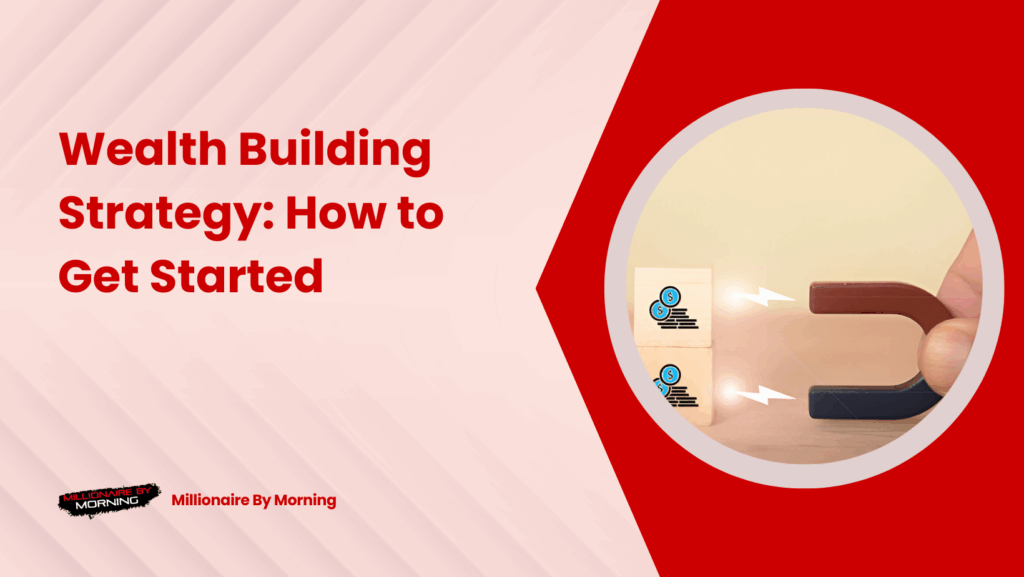
You’re in your 50s, sitting with a sinking feeling. A stack of bills is in front of you. You’ve worked hard for decades. But your savings tell a different story. You don’t have any savings or extra income you can rely on if you retire. Just a full-time job that pays the bills but drains all your energy.
Unfortunately, this isn’t just an imaginary scenario. It’s a reality for 62% of Americans who live paycheck to paycheck.
So, how can you break the cycle? You need a wealth-building strategy to level up financially.
Table of Contents
ToggleStep-By-Step Guide to Wealth Building
Building wealth isn’t about getting lucky overnight and winning the lottery. It means you need a framework that you can implement to get results. If you’re curious how to create wealth from nothing, then this blog is for you.
So, let’s not wait further and talk about the step-by-step guide.
You Need a Wealth-Building Mindset
The journey to financial independence starts with your mindset. You need to transform your thinking style to build generational wealth.
First, you need a shift from consumer to investor thinking. This means you should change how you view money, time, and opportunity. People with a wealth-building mindset know that true wealth comes from owning assets that work for you even when you are resting.
Further, you should embrace gratification, focus on acquiring assets, and invest in financial education. Always think about long-term opportunities and network with wealth-minded people.

Increase Your Earning Potential
Next, you need money to make more money. So, learn to increase your income and create multiple income streams.
Evaluate how much you can earn with your current job. You can learn new skills and upgrade your existing skills to qualify for high-paying positions. Get certifications, attend workshops, and apply for specialized training sessions in your industry.
Or if you have an entrepreneurial mindset, you can also enter the business world.
It may be a good idea to start a new business doing something you enjoy. But starting from scratch often intimidates people who don’t have experience running a business. If that’s the case, you can buy an established business. To further reduce risk, you can look into franchise businesses.
Save Money in the Long Run
Saving money isn’t about pinching every penny. You don’t have to give up on basic comforts. You can still enjoy online shopping, buy coffee occasionally, and order food delivery sometimes. Instead, be smart with money.
Start by creating a simple budget. How much do you make? Where does it all go? Maybe you have unused subscriptions you can cancel. You can adjust your expenses to save more without cutting out every joy in life.
Do you have emergency funds? Your savings account should have enough funds to cover six months of your living expenses. It’ll give you a financial safety net to avoid going into debt if things go wrong.
Right, here’s a bonus tip! Don’t put all your savings in a savings account. Consider storing part of the funds in precious metals like gold and silver. This way, you can preserve the value of money over time and stop worrying about inflation.

Invest for Passive Income
Saving is essential. But it’s not smart to let your money sit idle for long. In fact, your money grows when you start investing.
So, if you aim to build wealth in your 30s, put your earned money to work.
But before you jump into building passive income sources, you need a risk assessment. Determine your risk tolerance. Are you okay with short-term ups and downs for higher long-term returns? Or would you prefer a stable, low-risk approach?
Next, you need to learn about investing. Read blogs and books, watch tutorials, or take online short courses. Also, you can find a trusted financial advisor for expert guidance.
When investing, diversification is key. A mixture of income streams can generate better returns and reduce risk.
Protect Your Assets
You’ve started making money and are good at saving and investing. But here’s the catch: you can lose it all if you don’t protect your assets.
So, don’t ignore insurance. Life and health insurance are non-negotiable. You may need business insurance policies if you decide to become an entrepreneur. Don’t let an emergency or accident eat up all your assets!
Next, let’s talk about taxes. It’s time to learn about legal tax-saving strategies. For instance, you can contribute to retirement accounts, claim deductions, and form a business entity if you’re self-employed to keep more of what you earn. It’s best to consult a tax professional.
Further, think about legal protection. When your net worth increases, create an estate plan. Set up a will or trust to ensure your wealth is passed on in the way you want.

Wealth-Building Assets You Should Explore
Now you must be aware that relying on just a job or a business isn’t a smart move. When it comes to wealth-building strategies, you need assets.
Back in the day, buying a property was a reliable source of income. Investing in real estate is still very much profitable. It can help you generate stable cash flow and protect your investment. In addition, you can invest in stocks, bonds, and collectibles such as art, music CDs, rare coins, and stamps.
Some of these assets can be more high-yielding than others. So, do your research to understand the pros and cons of each industry.
Get Into Real Estate
In 2024, the average ROI on real estate investments is 10.6%. This high yield makes it an attractive investment option. In addition, investing in properties enables you to build tangible assets.
With real estate investments, you can get significant tax breaks. And if you rent out your properties, you can enjoy regular cash flows through rents.
Thinking about starting your real estate investment journey? Then research your target market to identify which areas offer the best opportunities. You can pick residential and commercial properties or vacant plots of land for new construction.
As a beginner, you may find residential properties such as single-family homes or small apartment buildings easier to manage. Then it’s up to you whether you want to flip them for a profit or rent them out to generate passive income.
If you are experienced and have high capital, you can look into commercial properties. Office spaces, retail units, and storage warehouses usually offer higher returns.
Regardless, you’d need a reliable exit strategy to make your investments fruitful.

Buying Real Estate Notes
Want the benefits of real estate investing without dealing with property management? Then private real estate notes may be the right choice for you.
Private notes secured by real estate are promissory notes that guarantee loan or mortgage repayment. Think of it this way. You act as a bank instead of buying a property yourself. You lend money backed by real estate. Then all you have to do is collect interest payments.
With this approach, you can invest in real estate while someone else manages all the headaches of property ownership.
Confused about how to get started? The three main opportunities you can dive into include:
- Fix-and-Flip Loans: You can offer fast cash loans for premium rates
- Seller-Financed Loans: You can target potential property buyers who don’t qualify for traditional loans
- Private Mortgages: You can offer loans to responsible buyers interested in buying their first house but don’t fit all banking checkboxes
Private real estate notes require industry knowledge. Also, verify borrowers through comprehensive background checks before approving a loan.
Stock Market Investment
Do you want your money to grow over time? Or do you want to diversify your investment portfolio? Either way, don’t ignore the stock market.
If you know what you’re doing, you can make it big in the long run.
When it comes to the stock market, there are two main strategies.
For short-term profits, you can choose stock trading and sell stocks for profit when the price increases. But if you’re interested in long-term profits, you can buy and hold them to earn dividends. Dividend-paying stocks work as a steady, passive income source.
The key is to spread your investment across different industries and companies.

Retirement Accounts
Wealth building is a long-term journey. So, don’t only think about making profits in the present. You need to think about your future, especially retirement.
Retirement accounts like 401(k) and Roth IRAs are powerful wealth-building assets. Does your employer offer a 401(k) with matching contributions? Then contribute enough per month to get the full match.
As for Roth IRA accounts, they ensure your investment and withdrawals are tax-free. The only catch is you can’t withdraw the amount before retirement without penalties. That’s fair, though!
Setting up retirement accounts promotes financial discipline. So, start early and make the most of retirement accounts. You will thank yourself when you see your account after retirement.
Risky Assets to Be Wary of
Wealth building isn’t just about what you invest in. If you aren’t careful, some assets can quietly drain your investment.
One of the riskiest assets is depreciating assets. Think of luxury cars, designer bags, and expensive gadgets. They look impressive and may or may not improve your quality of life. But they lose value over time. So, they don’t fit right into wealth-building strategies.
Next, understand the liquidity of assets. Some assets aren’t highly liquid. So, it may take longer to find the right buyers. As a result, you either need to wait for a long time or sell them for lesser profits. Some examples of such assets are rare collectible items and private equity deals.
Moreover, beware of high-fee investment products. These assets can generate good profits. But the high fee eats into your profits. Actively managed mutual funds, certain types of annuities, and advisory services with hefty commissions are examples of these high-fee assets.

Ending Note
Building wealth isn’t easy. Especially when you’re living paycheck to paycheck. But don’t worry, it is never too late to change your financial story. With the right mindset, a good wealth-building strategy, and consistent action, you can create a future where you can live comfortably.
So, start by shifting how you think about money. Increase your income, manage expenses, and invest in assets that grow over time. From real estate to the stock market, choose avenues that align with your goals. And steer clear of flashy purchases that do nothing for your long-term wealth.
The journey to financial freedom won’t be perfect. But progress always beats perfection. So, take that first step today and keep going. Your future self will thank you for getting started.
